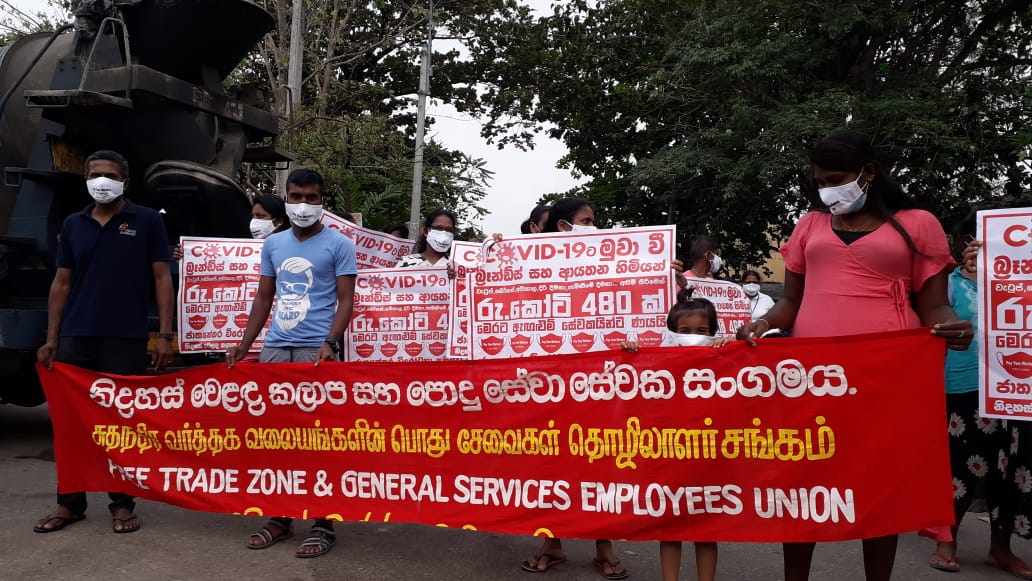
Sri Lankan garment workers suffer during pandemic, while brands and manufacturers continue to make profits
Labour rights advocates today published a brief on the situation of the Sri Lankan garment industry during the pandemic, which reveals that apparel brands, retailers, and manufacturers have continued to take in huge profits while cutting costs at the expense of workers' health, employment security, and income. The organisations behind the brief are urging brands and employers in the Sri Lankan garment sector to start a national dialogue with unions to ensure workers’ rights, wages and health are safeguarded.
The Covid-19 pandemic has had devastating effects on the well-being, health, and rights of Sri Lanka’s 300,000 garment workers, the majority of which are women who have migrated from villages to the country’s garment hubs. These effects include non-payment of wages and bonuses, attacks on trade unions and their members, and several mass Covid-19 outbreaks which have led to new infection waves in the country at large. Garment manufacturers have further exacerbated this crisis through their failure to comply with tripartite agreements to address the crisis and and refusal to include worker representation in their Covid-19 response. As a relatively small player in the international garment sector, however, the supplier country to brands such as Next, PVH (Calvin Klein) and Nike has thus far gone under the radar of large scale international scrutiny.
This is why a group of trade unions and labour rights organizations in a brief today call upon brands and factory owners in Sri Lanka to address the issues ranging from inadequate health and safety measures to withdrawal of attendance bonuses and transport allowances, and the imminent closing of several large factories employing thousands of garment workers. The organisations behind the brief call for a national dialogue with a crucial place for the country’s garment worker unions.
The Joint Apparel Association Forum (JAAF), representing manufacturer’s interests, actively fights workers’ right to in turn represent their own interests. As a result, a sector representing 40% of the country’s export only has one collective bargaining agreement -- in a unionised factory that is poised to close.
Anton Marcus, joint secretary of the FTZ GSEU union in Sri Lanka states: “Employers have during the pandemic used various tactics to push employees out of employment, often without paying legally entitled compensations, and are arguing that they cannot pay full wages and bonuses, even though they are massive companies. Brands and suppliers must take responsibility for the workers in their supply chain. In Sri Lanka, this should start with a national dialogue between manufacturer association JAAF and unions; an invitation we have extended many times, but which JAAF has thus far ignored.”
The brief is urging brands producing in Sri Lanka to encourage a worker-centred and industry-wide solution, reached through labour-management dialogue with the aim to resolve the industry problems and reform the industry’s practices. Unfortunately, with few exceptions brand responses to a draft version of this brief have been discouraging, and very little progress has been made.
This is in line with a general lack of supply chain responsibility in the garment sector during the pandemic. Instead of monitoring how workers’ in their supply chains were treated during this crisis, brands and retailers resorted to cancelling orders, delaying payments, further pushing down already low prices. Instead of pushing their suppliers to uphold workers’ rights during these challenging times, brands and retailers turned their back on manufacturers, leaving them free to trample worker rights and benefits at a time when they are most desperately needed.
Background
The monthly minimum wage in Sri Lanka is only 13,500 LKR (68 USD), far below what is needed to survive, and workers work long hours, often skipping lunch and breaks to meet production targets and increase their earnings to what is still a poverty wage. Average earnings of an experienced sewing machine operator or fabric cutter are about 23,500 LKR (short of 120 USD), which is nevertheless far below a living wage -- leading to coping strategies as working excessive overtime or skipping lunches. During the pandemic, many workers did not even receive these meagre wages, resulting in additional difficulties to put food on the table or to pay for their children to go to school.
The Sri Lankan garment industry is dominated by three huge manufacturing companies -- Brandix, Hirdaramani and MAS Holdings -- each with over a dozen factories employing tens of thousands of workers, producing garments for global brands such as Gap, Ralph Lauren, Victoria’s Secret, Marks & Spencer, Levi’s and others. The manufacturers and their brand customers are billion-dollar corporations, and are immensely profitable, even during the current pandemic.
The brief “COVID-19 Pandemic: A Pretext to Roll Back Sri Lankan Garment Workers’ Rights” is available here.